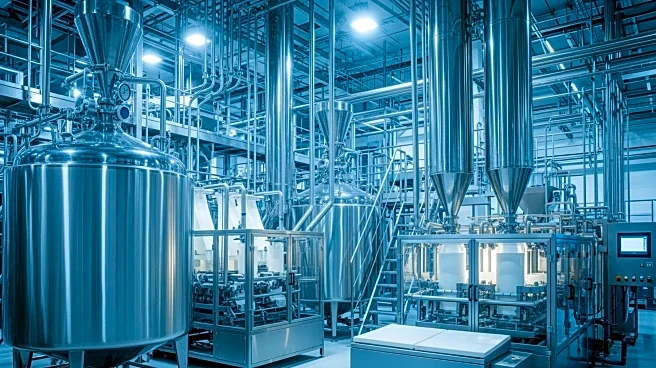What's Happening?
Bel Group, in collaboration with Standing Ovation, has successfully developed a method to produce casein proteins from whey using precision fermentation. This innovative process utilizes patented microorganisms
to transform acid whey, a by-product of cheese production, into all three major casein proteins: alpha S1, alpha S2, and beta. The production is not limited to laboratory scale but has reached industrial scale, marking a significant technological advancement. The process is environmentally beneficial, reducing CO2 emissions by 74% and land use by 99% compared to traditional animal-derived caseins. However, regulatory approval and pricing remain hurdles for market entry.
Why It's Important?
This development is crucial for the dairy industry, as it offers a sustainable alternative to traditional casein production, which is resource-intensive. By utilizing whey, a by-product, the process supports a closed-loop system, minimizing waste and environmental impact. The innovation aligns with Bel Group's commitment to carbon neutrality by 2050 and represents a significant step towards sustainable food production. If regulatory approvals are obtained, this could revolutionize the dairy sector, providing a more eco-friendly option for casein production, potentially benefiting both producers and consumers.
What's Next?
The next steps involve obtaining regulatory approvals, particularly in Europe, where Standing Ovation and Bel Group are based. In the U.S., some precision fermentation-derived caseins have achieved GRAS status, but broader regulatory acceptance is needed. Additionally, pricing strategies must be optimized to make these next-generation caseins commercially viable. As production scales up, Bel Group plans to expand partnerships with other major dairy players, potentially increasing market presence and consumer access to these sustainable casein products.
Beyond the Headlines
The ethical implications of this development are significant, as it addresses the environmental concerns associated with traditional dairy farming. By reducing reliance on animal-derived caseins, the process could lead to a shift in consumer preferences towards more sustainable dairy products. This innovation also highlights the potential of precision fermentation in transforming food production, paving the way for further advancements in the industry.









